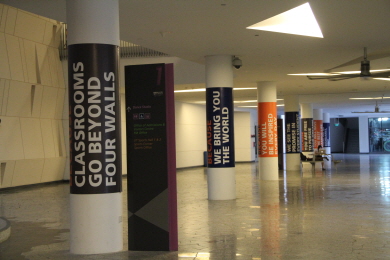
The columns for the Stephen Riady Centre building are covered with the slogan “classrooms are beyond the walls.” This slogan signifies that in addition to the highly organized education inside NUS, the education continues on to a global dimension, spreading out to the world.
According to International Relations Office (IRO), undergraduate students are provided with the opportunity to study abroad at one of 300 universities in 40 countries.
“7 in 10 students actually study abroad through our programs at least once,” said Koh Li ling, the Associate Director at IRO.
To cultivate students with broader perspectives, NUS provides various global programs as well as student exchange programs. One of the special program NUS offers is NUS Overseas College program (NOC). The distinctive aspect of NOC is that students can study academically and learn to handle work at the same time. While studying at prestigious universities, students get to work at start-up companies, where they can experience work-related issues from A to Z.
“In small companies, they can work closely with in-depth level, which help them acquire faster professional skills,” professor Ashraf added. “Moreover,we tie them up with one of the best schools around the world. The students can become very useful and productive members of the company but they would also not miss out on their studies.”
Another mix of real-time experience with deepening intellectual capacity is International Research Attachment Programme (i-RAP). i-RAP offers students opportunities to undertake in-depth research under the mentorship of world-class researchers. For instance, spending summer in the University of Oxford, students can engage in research activities under the supervision of Department of Engineering Science of Oxford.
A stint at recently emerging countries is other unique approach of NUS global programs. Through NUS Study Trip for Engagement and EnRichment (STEER), in a mix of classroom-based learning and site visits, participants are able to academically and practically experience abrupt changing world. Inaugurated in 2010, STEER has brought students to newly developing countries such as India, Latin America, Myanmar and Sri Lanka.
“STEER Myanmar gave me the opportunity to visit a country that had only recently opened up to tourists, and to see the changes that this had bought and would bring,” said Mark Heng Shu Xun (NUS, 4) who embarked on his honors thesis with his experience through the program.
In collaboration with international institutions, NUS Double or Joint Degree Programme opens a gate to further improve its education into a global dimension. Through these partnership, students are awarded degrees from world-known universities such as French Grandes Ecoles. Furthermore, not losing its geological location in Asia, Yale-NUS College manifests NUS’s attempt to create an educational environment in collaboration with a top university.
“Yale-NUS allows more interaction between professors and students with many new courses,” said Daniel Silverman who is majoring in Global Affairs at Yale-NUS college. “Moreover, students can study Asian cultures while easily immersing themselves in the culture in Singapore.”
When asked why they came to NUS, many international and exchange students answered “because NUS is the No.1 university in Asia.” In order to live up to such expectations, NUS is continuously proving its leading movement of nurturing future global leaders.
Kang Na-min
jina6502@ewhain.net

